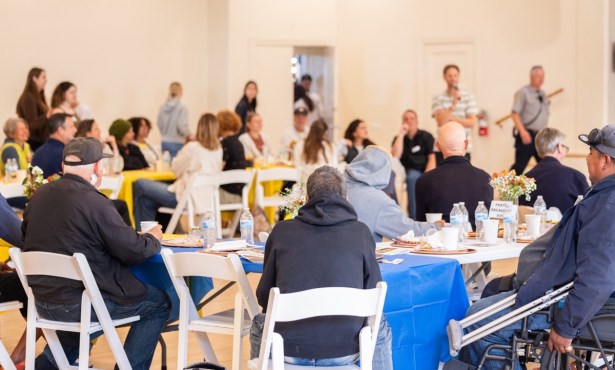Intact, Unaltered, and Out of My Mind
Poodle Barks at City Council
FIX IT: Talk is cheap. Time is money. What am I doing with my life? These are precisely the thoughts any sentient observer might experience after spending 10 minutes attending any Santa Barbara City Council meeting. In that time, Kate Smith — Santa Barbara’s omnipresent, omnivorous advocate gadfly — will submit speaker slips under three different names so she can make three separate trips to the podium to rail on about the “school-to-prison pipeline.” If medical marijuana is on the menu — and when is it not? — you will hear the same people say the same things that they’ve said at least 14 times before. And you will hear about a budget problem that has cascaded, year after year, into the worst fiscal crisis to afflict the city since the bottom fell out of the hide-and-tallow market back in eighteen-ought-six.

This Tuesday, councilmembers endured at least 30 minutes of gratuitous palaver from its Parks & Rec staff to explain how they were going to bridge a $30,000 budget shortfall by raising fees on 21 programs. If we proceed at this same snail’s pace — one minute for every $1,000 gap narrowed — we’ll have to endure no less than 9,000 hours of such staff reports before the council can even begin to address the $9-million budget crisis now looming before it. That translates to 375 days.
My despair only expanded as the council moved on to what promises to be the next political flashpoint — a spay and neuter ordinance. Normally, one might think this would be a no-brainer. The number of dogs and cats jammed into the county’s animal shelters has doubled in the past 10 years, and the number of feline and canine executions has jumped accordingly.
The City of Santa Barbara contributes to nearly half — 44 percent — of that population. Every day, no fewer than eight four-legged creatures are taken out and dispatched — at the point of a needle carrying a lethal elixir dubiously dubbed “euthenol” — to meet their maker. But this being Santa Barbara, there are no no-brainers. After the 24 people who signed up to testify had spake their piece, I learned that, in reality, such ordinances are banana peels on the slippery slope toward state totalitarianism: It would give vets “god-like” authority over the reproductive destinies of Fido and Fifi; such laws place otherwise “responsible” pet owners at a Darwinian disadvantage when it comes to propagation of the species. The end result of such legislative meddling, we were warned, would be streets teeming with wild and rabid dog packs let loose by society’s irresponsible elements. To be fair, opponents did raise some interesting points. If existing laws were not being enforced, they asked, how could City Hall think the new one would be, especially given recent cuts to the animal control budget?
After all the rhetoric, the simple fact is there are way too many animals on death row — notwithstanding the stellar accommodations provided by local shelters — for no good reason. If your vet charges an arm and a leg to “fix” your pet — some as high as $750 — the Humane Society performs snip-jobs for less than $60. There’s just no excuse.
Where others were invigorated by the passionate intelligence demonstrated by opposing parties, I felt only anticipatory dread. This same debate already consumed 18 months of public time as it went through the county’s legislative process. More than 100 people testified at the first public hearing; closer to 70 at the second. There was no cloture or closure. It’s an inflamed argument for which no anesthesia exists; it’s Roe v. Wade, doggy style. And now it was starting all over again.
My proposal in this case is not to cut the baby in half, but rather to kill two birds with one stone. (But humanely, of course.) If people want to talk, let them. But make them pay. It won’t solve the budget mess, but it will definitely help. The first trip to the public speaker’s podium should, of course, be free. That’s democracy, that’s free speech, and that’s certainly good marketing. But there’s nothing in the Constitution that gives the angry parents lambasting the existence of medical marijuana dispensaries, as just one example, a god-given and inalienable right to repeat themselves ad nauseam. I’d suggest a graduated fee structure, whereby speakers are charged progressively higher amounts every time they make the same point. If new information or arguments are presented, then no fees would be charged. In addition, the council should consider a cliché tax. For people exhorting the council to “think outside the box” or those who make reference to “game changers,” I think a $10 surcharge is only reasonable. For people expressing concern that someone or something was about “to be thrown under the bus,” $5 would suffice. Fifty bucks should be charged for those who use “sustainability,” “living within our resources,” or “preserving our quality of life.”
To be fair, this new approach should go both ways. Elected officials should be charged no less than $100 every time the word “proactive” escapes their lips. Likewise, for those who claim to offer “common-sense solutions,” promise “to shed more light than heat,” liken a camel to “a horse designed by committee,” or confess that the difficulty confronting them is akin to “nailing Jell-O to a tree,” that’s another $100. Frankly, I’d like to see the creation of a whole bureaucracy designed to root out such affronts to linguistic originality. We need cliché cops on patrol 24/7, muzzling evil-sayers who use expressions like “24/7.” Some clichés are so heinous that only the most extreme sanctions are appropriate. No fine, no matter how extortionate, is adequate punishment for those who dredge out Mark Twain’s much-abused line, “Whiskey’s for drinking and water’s for fighting over.” For that, only banishment will do.
In the meantime, curb your human.



